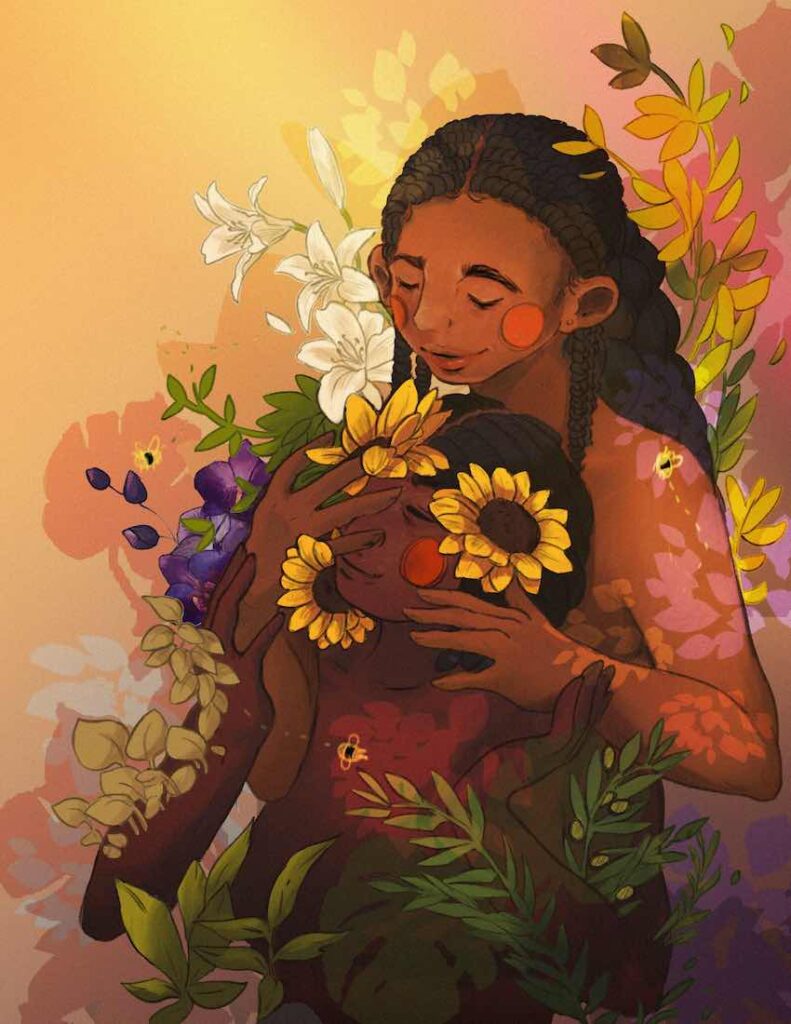(Content Warnings: emetophobia, light body horror, references to a depressive episode)
Flowers bloom when her wife speaks. Maud hides her smile as she watches Prism—her wife. Oh, she would never tire of the word.
Light filters through her wife's smile and casts colours over her flush brown face. Prism's happiness is a tangible thing, blooming over her arms in rainbow shades. Violets cling to the corners of her mouth, her tongue stained green by the winding vines of her words. Sunflowers peek through the green shrub of her untamed hair. Searching leaves of aster and olives sprout from her body like fingers of summer light. It seems eternal, if only for a moment. She is chthonic, perfume of the earth rising beneath her curled toes.
When Maud holds Prism, a vivarium filled with verdant verdure blossoms between them. The grass scratches her skin as bees bumble lazily from lilies to rosy acacia. Life is love. So she carries Prism's love, laughing when the vivarium inevitably overflows, honeydew and lovely lavandula spilling through welcoming fingers. Melanted hands, dirt smudged palms, and a stray leaf across her wife's nose. Smiling, she kisses Prism around the rose in her mouth.
As is inevitable in the cycle of flora, though, a wilting overtakes Prism. It is a steadily rising buzz, a distant nyctinasty that creeps in like a solstice night. Black roots like lightning trail under Prism’s skin, her stress tangible as flowers fall away. Weeds fall from her mouth when she complains, pressing at over-watered yellow spots on her cheeks. Creeping plants invade every corner of their home as her wife wanders the halls in a vertiginous daze. A ghost of burnt grass, Prism sulks as dandelions fall from her limp hair. She collapses onto the couch, hidden in a forest of hanging fronds and potted foliage, and sighs like the winter wind. Maud follows after her wife, picking up the yellow weeds and dreaming of wishes lost. Though coarse golden teeth litter the floor, the dandelions are part of Prism’s garden and Maud wants to protect them. She salvages them like a collector who presses dry fluff and flowers between the pages of their shared history. Their beauty, however, is a point of contention. Your weeds are not like toenails, Maud asserts staunchly.
Eventually, moss covers Prism's skin as she flags. Maud keeps her close, murmuring caring words into her wife's palm as her fingers trail through her leathery, worn patches. This is what she does. She takes the good with the bad, picks the pests from her wife's lashes—the lies, the doubts Prism tells herself—until the flowers return. Grass soon makes way for yellow jessamine and dandelions crowded in chipped clay pots.
•••
Her wife's words are ice when she speaks. Her wife, who blooms like a daisy and smiles like a diamond, now snarls like a storm. Maud wipes wet crystals from her agate eyes and looks away. But she does not leave.
Frost slithers across Prism's lips with the hiss of biting words. The brown of her skin is washed out with cool anger. It settles on her body like layers of snow: building and building before crashing in a deluge of powered slurry that leaves Maud plucking ruined pieces of clay pots. Prism is in motion and she stomps from the room. Ice follows her, a haphazard trail that melts as soon as it forms.
When Maud reaches for her wife, she receives a touch like a stinger. Icy anger laces her skin in uncaring lines. Those lines turn to roots of doubt that prick her mind. Black dahlia sprouts in Prism's hair, tiny green dots amid a coily field of chilling grey. A crushing weight fills the room, freezing the dandelions in their pots. Ashy leaves peel off her skin with great effort, shattering when they fall from her hands. Tree nettles cling to the sides of her mouth and decaying rose petals fall from the lash of her tongue. Wounds that Maud will lick later, a soothing balm on the scars she hides.
A frigid tundra spans the gap on the bed between them. But a garden lies beneath it all, waiting to be thawed, a bear hibernating through winter. The blade of frost stings Maud's heart. She knows she is enough, but just as much, she knows she does not deserve this.
Instead, Maud curls under the covers and hides beneath the veil of her black boxy braids. But she is no coward—her defiant hand remains in the valley, frostbitten fingers flexing in the low light.
But the blizzard never stays for long. It can't in this house, blanketed by the thick, relentless heat of Maud's determination. Eventually, Prism’s fingers creep toward hers like buds through thawed earth. Her apology is an inquisitive cat testing unchanging waters, a pinkie wrapped around hers. And when Maud does not move, her wife gains ground. Yarrow flutters from her mouth and rich hyacinth curls across Prism's skin. Purple veins gather at the bulb of her hand, tendrils chasing after the fleeting cold. Its weight is still palpable, mint on Maud's tongue.
The land is cold, the gap is wide. There is work to be done, but the touch of her wife's hand is an unspoken apology. Streams of sun filter in, warming the wilted flowers. A petal reaches for the light.
•••
There is moss when her wife speaks. Not the wet kind—a hopeful blanket, soft as down. Maud melts at the sight of her; she is an ever-changing river.
Radiant by the light of an open window, Prism whispers, I’m sorry. Burgeoning flowers open beneath her fluttering hands. She’s holy as a carnosa, repentant, green ivy crawling over her arms. Life emerging after the seasonal white. Her lush fir hair falls in tight curls, a circle around her body. Prism's voice is a rose, thornless. She holds out a hand, clover twining through her fingers, ring-like. Leaves flutter to the ground and land softly.
Gathering her courage like a bouquet, Maud takes her wife in her arms. Cheeks pressed together, bodies close as bulbs in turned earth, she breathes in the scent of petrichor and honey. Prism kisses Maud, dandelion fluff on slightly dry lips. Another apology is murmured into her mouth, tasting of sugar petals. Rosemary and rue overflow where they touch. Heather smears Prism's hand, daubs of purple in the valleys of her fingers. Insects buzz through their vivarium. Prism laughs sunflower seeds at the stripes of pollen on Maud's face.
The smell of spring cottons the air. Maud listens. Her wife speaks endlessly, filling the silence with flowers: violets on violets on violets.
The cycle will come again, in dandelions and yellow moss, in snowdrops and lilac blooms that look like floss. What Prism can't change, she doesn't, and neither can Maud. But love is work. So Maud tries. She tries: offers fertile tending with the patience of a gardener watching buds unfurl. She loves a woman who speaks the language of flowers.
Her wife.



